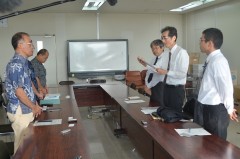19 Japanese nature study organizations seek reassessment of new U.S. base in Henoko, including cancellation of construction

On November 11, Makoto Kato (from back on the right-hand-side) of the Ecological Society of Japan, Masanori Sato of Japan Association of Benthology and Masami Obuchi of the Japanese Society of Systematic Zoology submitted a joint petition seeking conservation of Oura Bay to Okinawa Government officials (left -hand-side) at the prefectural government office.
November 11, 2014 Ryukyu Shimpo
Nineteen Japanese nature study societies, including the Ecological Society of Japan with 4,000 researchers, submitted a written request to the central government and Okinawa Prefectural Government on November 11. They seek to review the plan to build an alternative base in Henoko, Nago, for U.S. Marine Corp Air Station Futenma in Ginowan, and call for the cancellation of the construction. They also demand the government conduct another environmental impact assessment of the Henoko relocation plan.
Makoto Kato, chairman of the Nature Conservation Committee of the Ecological Society of Japan and a professor at the Graduate School of Kyoto University, Masanori Sato, chairman of the Nature Conservation Committee of the Japanese Association of Benthology and a professor at the Graduate School of Kagoshima University, and Masami Obuchi, a member of the Japanese Society of Systematic Zoology, visited the Okinawa Prefectural Government to hand their petition to the environment department’s officials. They handed it over on behalf of 19 institutions. It is rare for such a long list of signatories to make a joint statement to the central and local governments.
“More than five thousand species were confirmed in the water and land areas in the environmental assessment. After the assessment was made, new species and undescribed species have been found one after another. This fact is still generally unknown. We understand this matter [landfill] is a very troubling problem and this is an urgent situation. It is a global issue to preserve biodiversity,” Sato said at a press conference held after the request was made. He highlighted that the government should conduct strict assessment of Oura Bay, rivers and land to conserve the natural environment.
Kato stressed that the biodiversity of the sea, including the coral reef ecosystem, is something Japanese people can be proud of because Japan has few resources. He described Oura Bay as a “Japanese Treasure,” where biodiversity remains in particularly good condition on land and sea as one. “The Japanese government is taking the stupid action of destroying the world’s treasure by reclaiming the sea of Henoko. We can foresee the future of Okinawa in the fate of dugongs.”
They sent the written requests to the Ministry of Defense, the Okinawa Defense Bureau and the Ministry of the Environment by mail.
(English translation by T&CT)
Previous Article:All-Okinawa Bullfighting Autumn Tournament attracts 4,500 spectators
Next Article:Police dog Daniel awarded for finding missing boy
[Similar Articles]
- A natural treasure trove Oura Bay: Building new U.S. base will destroy the environment, nature and life
- Editorial: IUCN proposed recommendation will add to international pressure to stop Henoko base
- Ramsar secretariat demands environment ministry preserve sea of Henoko
- Seventeen groups issue a statement to seek the environmental protection of Henoko and Oura Bay based on the Ramsar Convention
- Opposition to Henoko Soil Hauling advises extending scope of invasive species prevention
 Webcam(Kokusai Street)
Webcam(Kokusai Street)


